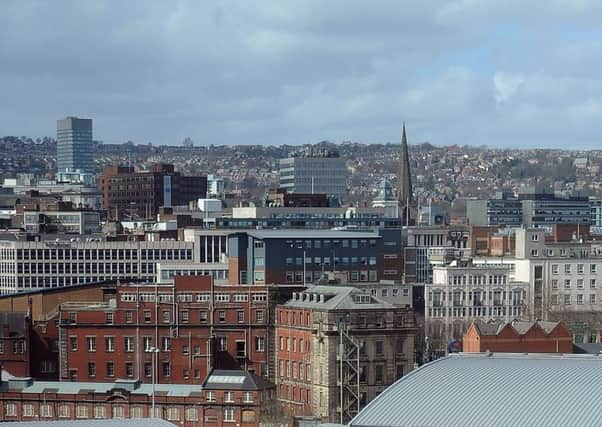Sir Keith Burnett: Yorkshire thrives when it welcomes a world of talent


It is not that we don’t have our internal squabbles. Yorkshire folk are notorious for “calling a spade a spade”.
But I also know that the people of Yorkshire are the most welcoming of people from around the world. How? Because that is what the people who come from all around the world to Sheffield University, actually tell me.
Advertisement
Hide AdAdvertisement
Hide AdIn fact, we even know that the Prime Minister is glad he is wrong because he tweeted that he wants Britain to be one of the first choices for talented students from around the world.
Why would he want that? Why do we at the University of Sheffield want it? What’s in it for Yorkshire? At a time when Europe is strengthening its borders, let me tell you why it is such a big deal.
First, let’s slay a few myths. Outsiders may like to think of Yorkshire as all flat caps, whippets and Last of the Summer Wine. But we know different.
Take the example of Bradford, part of the Northern Powerhouse long before it was even a twinkle in George Osborne’s eye. How did it become the wool capital of the world – a centre of not just trade but philanthropy and art, of grand Italianate public buildings, of great mills like Saltaire? The Industrial Revolution was an economic golden age for Yorkshire, but it also owed much to waves of immigrants. In the 1840s, Bradford’s industry attracted Irish workers who became 10 per cent of the city workforce.
Advertisement
Hide AdAdvertisement
Hide AdIt also drew refugee German Jews like Jacob Behrens who built a multi-million textile empire which had branches in London, Glasgow, Calcutta, and Shanghai. These newcomers became Mayors, Lord Mayors and philanthropists, founding the city’s Chamber of Commerce and charitable works.
And it wasn’t just industry which flourished. Behrens was concerned about skills and education, helping to establish the Bradford Technical College. The arts benefitted too. The great composer Delius was born in Bradford. Jacob Moser helped build the St George’s Concert Hall and there are 200 paintings by Bradford’s Sir William Rothenstein in the National Portrait Gallery.
And today as we try to seize what we hope will be a second Industrial Revolution built around innovation and knowledge, Yorkshire is still welcoming international talent.
Just look around our cities. In Sheffield, most of the cranes on the skyline which indicate redevelopment are linked in one way or another to our universities. When I show local people around the new state of the art teaching centre for engineering and other subjects at Sheffield, I know that without the international students all the students of Sheffield would not have that facility.
Advertisement
Hide AdAdvertisement
Hide AdWhy is that? Don’t we get Government funding? Don’t students pay a lot of fees? They do indeed pay, but nothing like enough to cover the cost of the very best facilities for expensive lab-based subjects.
When I see the vitality of our city centre and its plans for the future, I know that without the extra £120m a year extra investment into the city from international students, our plans might fall back on themselves.
And we are not unique. The same can be said of Leeds and York, Huddersfield and Bradford. Local people benefit from students who come to Yorkshire from all over the world. But it is much more than money. Being international is crucial for our industries and for future jobs.
On the site of the Orgreave coking works, we now see a wonderful advanced manufacturing research campus, a magnet to companies from across the globe. We already have 600 apprentices on site, and there will be more.
Advertisement
Hide AdAdvertisement
Hide AdHow did it begin? With a collaboration between our international university and a local machining firm with an eye on a global market, helped by a PhD student who came to the UK on a Vietnamese boat. An asylum seeker, who had much to give.
Today at the AMRC, weavers from Yorkshire are working to weave not wool but composites. They have won orders which are creating jobs and allowing investment.
But we would be naïve if we didn’t realise that this vibrancy is vulnerable to wider trends, and in particular fears about migration and asylum. How will Yorkshire respond? Will we turn inwards? For the sake of local youngsters who desperately need jobs and a better economy, for the sake of our elderly who need a properly funded system of health and social care, and for the sake of our wonderful universities, I hope not.
For Yorkshire to be a thriving success and a true Northern Powerhouse, we need to be globally competitive and open to the ideas which will make us so.
Advertisement
Hide AdAdvertisement
Hide AdThe Prime Minister should not under-estimate Yorkshire. We have a proud history of welcoming talent from across the world, weaving it into our own industrial and civic life, and then taking what we have learned to trade with the world. And we know that same spirit is just as important to our future.
Professor Sir Keith Burnett is vice chancellor of the University of Sheffield. It was included this month in a list of the world’s 100 best universities.